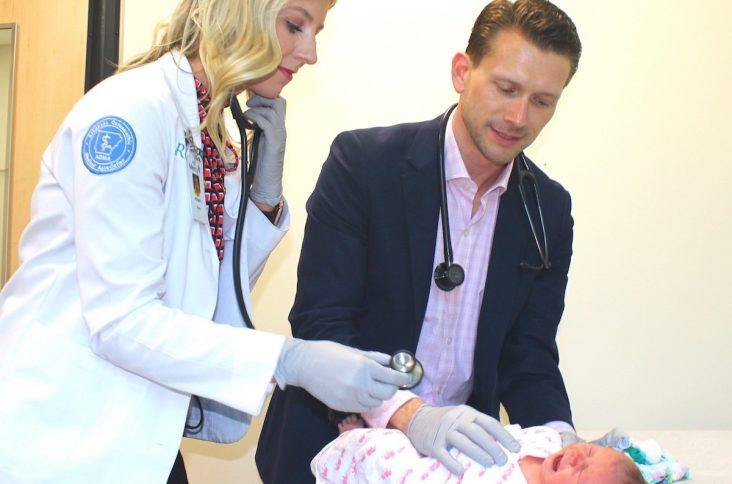ACHE and Mercy to partner on a new residency program
by February 20, 2020 5:32 pm 2,503 views

Abby Long and Dr. Kendall Wagner work with an infant patient.
A partnership between Mercy Fort Smith and Arkansas Colleges of Health Education (ACHE) will bring a new residency program to Mercy and an annual $23 million economic boost to the Fort Smith region.
The new residency program will be created thanks to a $1.3 million donation from ACHE. The partnership provides for the addition of new graduate medical education programs, with the Arkansas College of Osteopathic Medicine (ARCOM) acting as the sponsoring institution, and will begin the process of creating 48 medical residency slots at the hospital, according to a news release from Mercy. The residencies are expected to begin in mid-2021 or early 2022.
The partnership between ARCOM and Mercy intends to retain physicians in the area while boosting Mercy’s staffing numbers. It will address the physician shortage by “attracting and keeping the best and brightest minds in medicine in the area,” said Dr. Rance McClain, ARCOM dean. “With the combination of both organizations’ available resources and aligned mission, we can create a robust and rich academic environment in the Fort Smith and River Valley community.”
Officials will file immediately for the program with the Accreditation Council for Graduate Medical Education (ACGME), the accrediting body that sets standards for U.S. graduate medical education (residency and fellowship) programs and the institutions that sponsor them. ARCOM received accreditation to provide postdoctoral education by the ACGME in January 2019. That accreditation allows ARCOM to develop ACGME residencies including Family Medicine, Internal Medicine, Emergency Medicine, Surgical and more linked to hospitals across the region and the state of Arkansas.
“By creating the pipeline of new residency programs in Fort Smith and allowing Mercy the opportunity to recruit, train and retain our students, Mercy will have the ability to train its own future physician workforce,” said ACHE CEO Kyle Parker.
The residency program will help address the insufficient number of physicians in the region, which is part of the mission of both institutions. Arkansas ranks 47th out of 50 U.S. states with 207 physicians per 100,000 residents. The national median is 257.6, according to the American Association of Medical Colleges.
“We felt it was very important for us to find ways to address the shortage of primary care and internal medicine physicians in our area,” said Ryan Gehrig, president of Mercy Hospital Fort Smith. “This will be a great opportunity for us to do that for years and decades to come.”
The residencies will include internal medicine and family practice programs and ultimately will mean a total of 48 residents working in the hospital and clinic locations. The program is something Mercy had been working on for several years, Gehrig said.
“Establishing Mercy as a training location for these residents provides a boost to our patients as well as the community as a whole,” Gehrig said. “We want Mercy to be a facility where doctors can learn and ultimately become part of the team that provides the best available care for residents in the River Valley. We are thankful for this donation, which will help us achieve this.”
New residents will function in a variety of settings, including inpatient services in the hospitals, outpatient care in the clinics and even research or scholarly activity. Participants in the residency program will be rotating through almost all specialties at Mercy Fort Smith, said Dr. David Hunton, president of Mercy Clinic.
“Ultimately, as they approach the latter years of their residency, they’ll be able to work for us in our critical access hospitals, down in the emergency room and things like that, which will improve our safety net on patients at the hospital, in that we’ll have more doctors in house than we currently do. It really makes a difference in the quality of care that takes place,” Hunton said.
The impact on ARCOM students is equally important because there is a shortage on graduate medical education spots around the country, McClain said.
“In particular in Fort Smith and the state of Arkansas, there has not been enough residency slots to train and keep physicians in this area. These slots give our students more opportunities to stay and train in our area,” he said.
Hunton added that doctors are more likely to stay at a location where they’ve been trained, which makes the new residency program another way to retain physicians in an underserved part of the country. Residents will be given an annual salary ranging between $55,000 and $60,000 per year, Gehrig said.
“These residency slots will have a tremendous economic benefit in the community,” Parker said. “Statistics show that 80% of residents build a permanent residence in that location.”
According to the National Center for Rural Health Works, each primary care physician who sets up a private medical practice brings a projected $1.8 million to the community, the press release said.
“The economic impact for Fort Smith and the region is tremendous. These residency slots will bring $23 million added to the economy each year. So year one will bring $23 million, year two $46 million, year three $69 million, year four $92 million and year five $115 million. In five years these residency slots will have added $345 million to our economy,” Parker said.
In February 2019, ARCOM entered a partnership with Searcy-based Unity Health that allows medical school graduates residency programs as well as offer training opportunities for the school’s students.
“We are open to working with any and all health and educational institutions. We have a strong relationship with Baptist Health Fort Smith and other health institutions throughout our service region including Arkansas, Oklahoma and Missouri,” Parker said.
